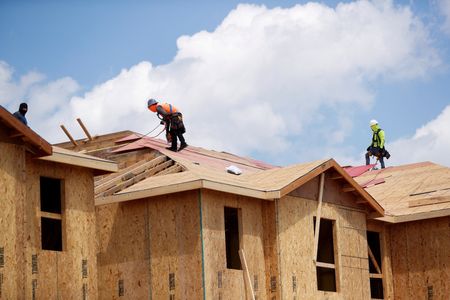(Reuters) – Confidence among U.S. single-family homebuilders fell for the 10th straight month in October as soaring mortgage rates and bottlenecks for building materials made new housing less affordable for many first-time buyers.
The National Association of Home Builders/Wells Fargo Housing Market index dropped eight points to 38 this month. With the exception of the short-lived plunge during the spring of 2020 when the country locked down during the first wave of COVID-19, this was the lowest reading since August 2012. A reading above 50 indicates that more builders view conditions as good rather than poor.
Economists polled by Reuters had forecast the index at 43.
The housing market has seen the most pronounced effects so far of the Federal Reserve’s aggressive interest rate hikes aimed at quashing the highest inflation in 40 years. Interest rates on the most popular type of U.S. home loan are nearing 7% – the highest since 2006 – and sales of new and existing homes have tumbled by roughly 25% since January.
Since March, the U.S. central bank has lifted its benchmark policy rate from near zero to a range of 3.00%-3.25%, and the fed funds rate is now expected to end the year in the mid-4% range with inflation yet to show signs of abating materially.
The government on Wednesday will publish the September figures for the number of new homes starting construction and volumes of permits being issued for new home building projects, both of which have declined sharply this year. Both are estimated to have fallen further last month.
“This will be the first year since 2011 to see a decline for single-family starts,” NAHB Chief Economist Robert Dietz said in a statement. “And given expectations for ongoing elevated interest rates due to actions by the Federal Reserve, 2023 is forecasted to see additional single-family building declines as the housing contraction continues.”
“While some analysts have suggested that the housing market is now more ‘balanced,’ the truth is that the homeownership rate will decline in the quarters ahead as higher interest rates and ongoing elevated construction costs continue to price out a large number of prospective buyers,” Dietz said.
The survey’s measure of current sales conditions dropped nine points to 45. Its gauge of sales expectations over the next six months slumped 11 points to 35. The component measuring traffic of prospective buyers fell six points to 25.
(Reporting by Dan Burns; Editing by Chizu Nomiyama)

